ICT Project Management Report: Methodologies, Comparisons, and PLC
VerifiedAdded on 2021/04/24
|8
|1559
|41
Report
AI Summary
This report delves into the realm of ICT project management, exploring various methodologies essential for successful project execution. It begins by defining project methodologies and their significance in achieving project goals within defined schedules and budgets. The report then provides a detailed comparison between two prominent methodologies: PMBOK and Agile XP, highlighting their similarities and differences in terms of outputs, project types, guidelines, and risk assessment. Furthermore, the report elucidates the relationship between Agile XP and the project life cycle (PLC), emphasizing its role in simplifying project complexity and adapting to evolving requirements. Key methodologies like Waterfall, PRINCE2, and Scrum are briefly mentioned. References to key sources like Schwalbe (2015), Pinto (2015), and Kerzner & Kerzner (2017) provide context and support the analysis. The report underscores the importance of selecting the right methodology for effective project management in the ICT sector.
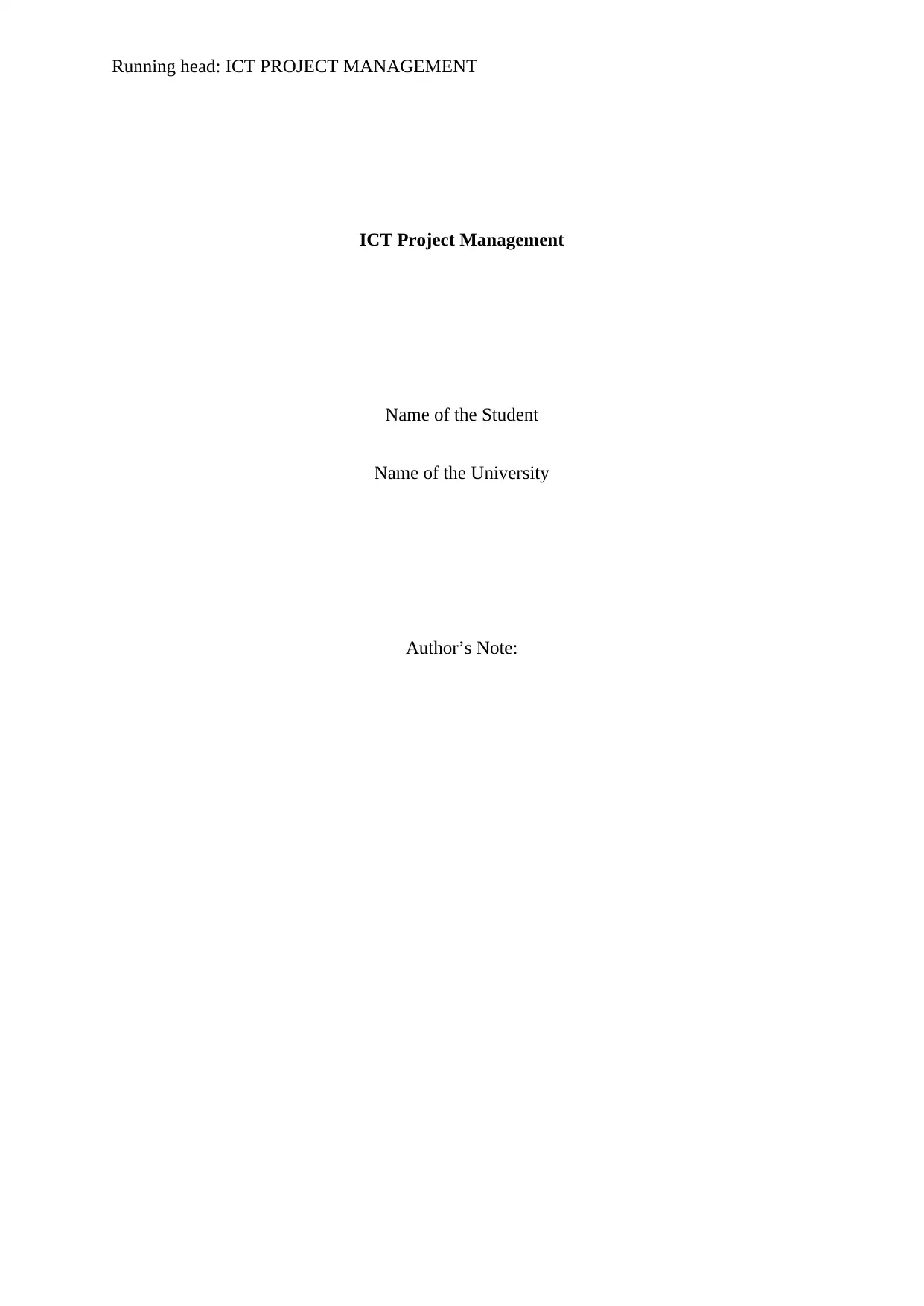
Running head: ICT PROJECT MANAGEMENT
ICT Project Management
Name of the Student
Name of the University
Author’s Note:
ICT Project Management
Name of the Student
Name of the University
Author’s Note:
Paraphrase This Document
Need a fresh take? Get an instant paraphrase of this document with our AI Paraphraser
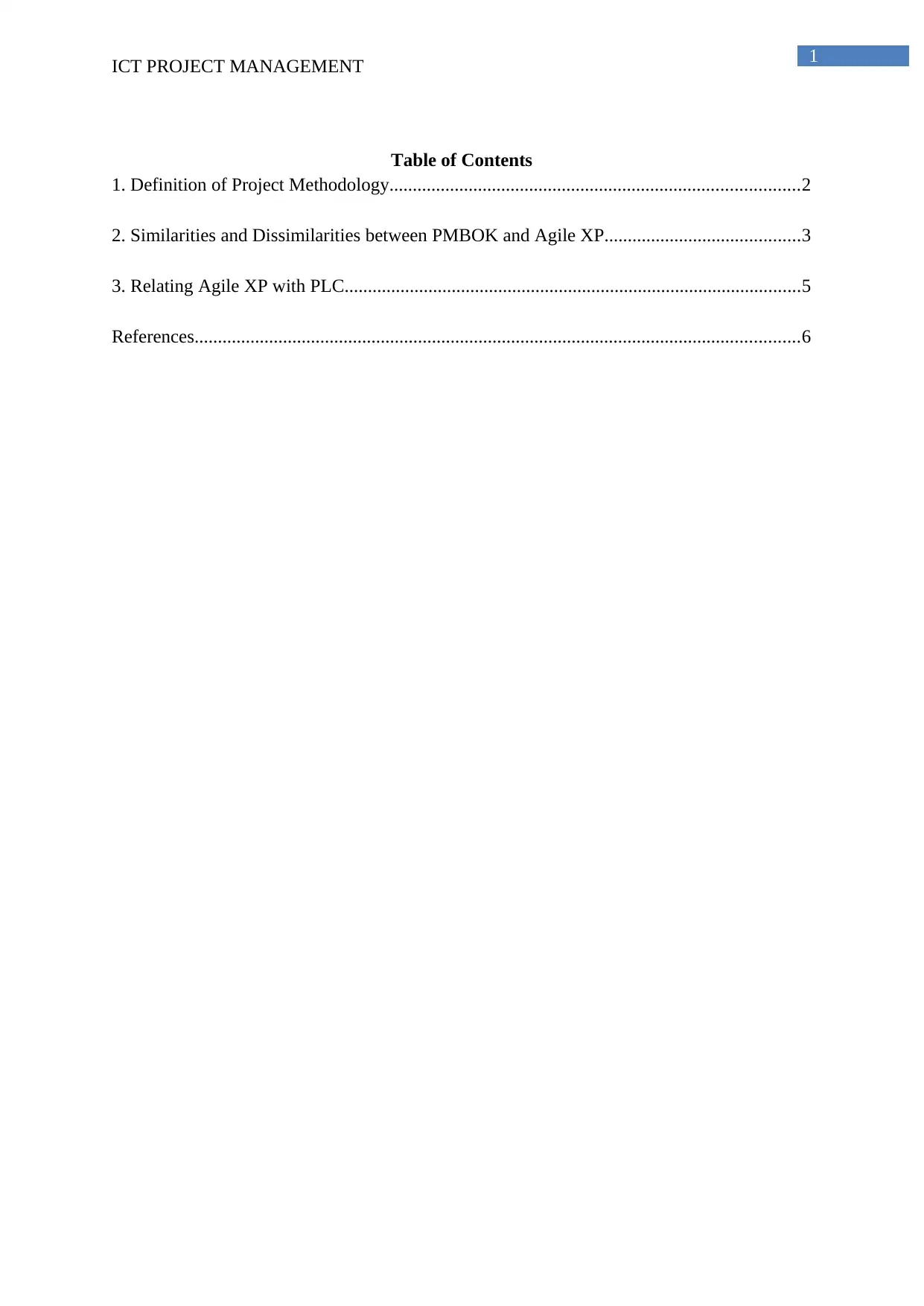
1
ICT PROJECT MANAGEMENT
Table of Contents
1. Definition of Project Methodology........................................................................................2
2. Similarities and Dissimilarities between PMBOK and Agile XP..........................................3
3. Relating Agile XP with PLC..................................................................................................5
References..................................................................................................................................6
ICT PROJECT MANAGEMENT
Table of Contents
1. Definition of Project Methodology........................................................................................2
2. Similarities and Dissimilarities between PMBOK and Agile XP..........................................3
3. Relating Agile XP with PLC..................................................................................................5
References..................................................................................................................................6
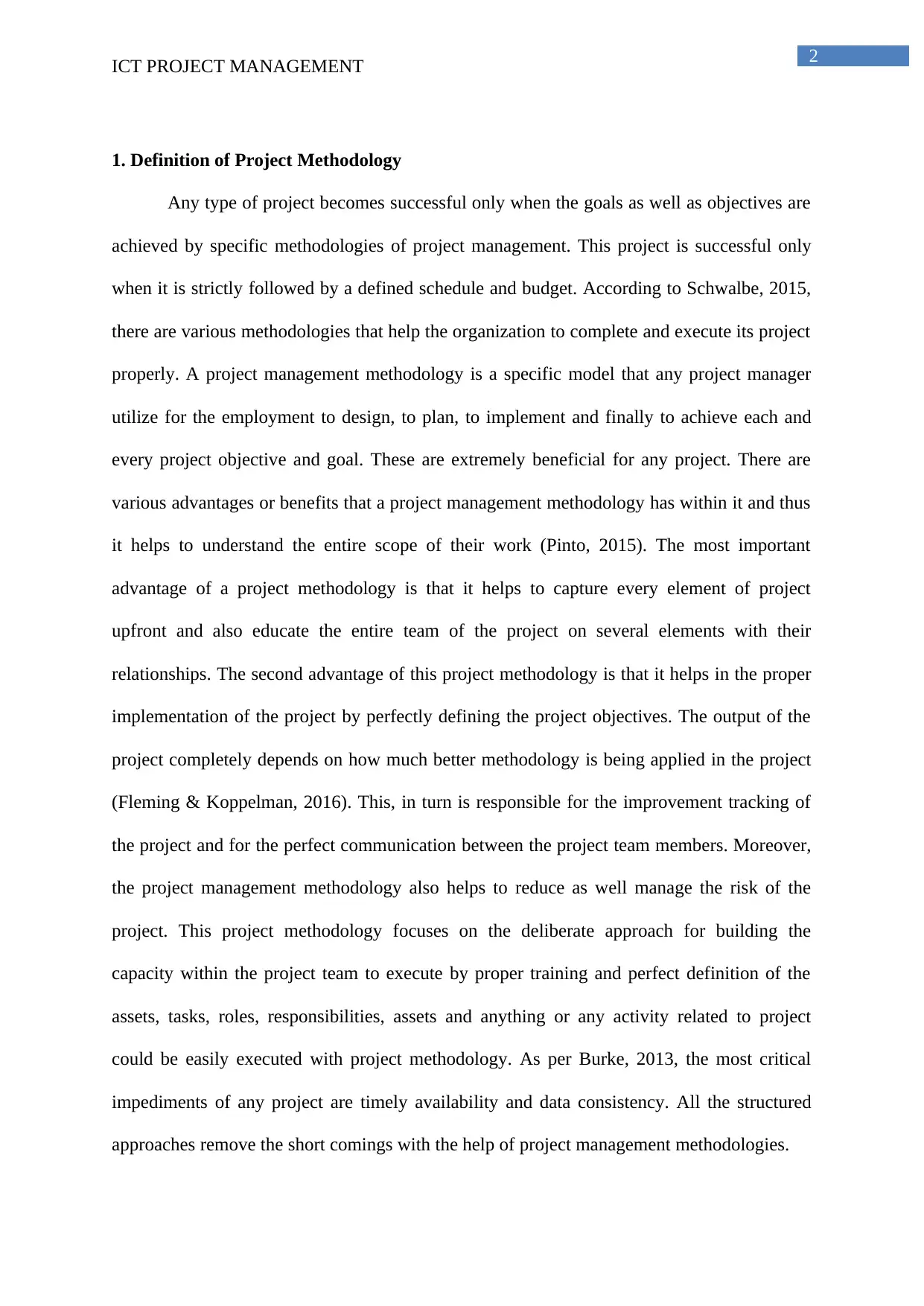
2
ICT PROJECT MANAGEMENT
1. Definition of Project Methodology
Any type of project becomes successful only when the goals as well as objectives are
achieved by specific methodologies of project management. This project is successful only
when it is strictly followed by a defined schedule and budget. According to Schwalbe, 2015,
there are various methodologies that help the organization to complete and execute its project
properly. A project management methodology is a specific model that any project manager
utilize for the employment to design, to plan, to implement and finally to achieve each and
every project objective and goal. These are extremely beneficial for any project. There are
various advantages or benefits that a project management methodology has within it and thus
it helps to understand the entire scope of their work (Pinto, 2015). The most important
advantage of a project methodology is that it helps to capture every element of project
upfront and also educate the entire team of the project on several elements with their
relationships. The second advantage of this project methodology is that it helps in the proper
implementation of the project by perfectly defining the project objectives. The output of the
project completely depends on how much better methodology is being applied in the project
(Fleming & Koppelman, 2016). This, in turn is responsible for the improvement tracking of
the project and for the perfect communication between the project team members. Moreover,
the project management methodology also helps to reduce as well manage the risk of the
project. This project methodology focuses on the deliberate approach for building the
capacity within the project team to execute by proper training and perfect definition of the
assets, tasks, roles, responsibilities, assets and anything or any activity related to project
could be easily executed with project methodology. As per Burke, 2013, the most critical
impediments of any project are timely availability and data consistency. All the structured
approaches remove the short comings with the help of project management methodologies.
ICT PROJECT MANAGEMENT
1. Definition of Project Methodology
Any type of project becomes successful only when the goals as well as objectives are
achieved by specific methodologies of project management. This project is successful only
when it is strictly followed by a defined schedule and budget. According to Schwalbe, 2015,
there are various methodologies that help the organization to complete and execute its project
properly. A project management methodology is a specific model that any project manager
utilize for the employment to design, to plan, to implement and finally to achieve each and
every project objective and goal. These are extremely beneficial for any project. There are
various advantages or benefits that a project management methodology has within it and thus
it helps to understand the entire scope of their work (Pinto, 2015). The most important
advantage of a project methodology is that it helps to capture every element of project
upfront and also educate the entire team of the project on several elements with their
relationships. The second advantage of this project methodology is that it helps in the proper
implementation of the project by perfectly defining the project objectives. The output of the
project completely depends on how much better methodology is being applied in the project
(Fleming & Koppelman, 2016). This, in turn is responsible for the improvement tracking of
the project and for the perfect communication between the project team members. Moreover,
the project management methodology also helps to reduce as well manage the risk of the
project. This project methodology focuses on the deliberate approach for building the
capacity within the project team to execute by proper training and perfect definition of the
assets, tasks, roles, responsibilities, assets and anything or any activity related to project
could be easily executed with project methodology. As per Burke, 2013, the most critical
impediments of any project are timely availability and data consistency. All the structured
approaches remove the short comings with the help of project management methodologies.
⊘ This is a preview!⊘
Do you want full access?
Subscribe today to unlock all pages.

Trusted by 1+ million students worldwide
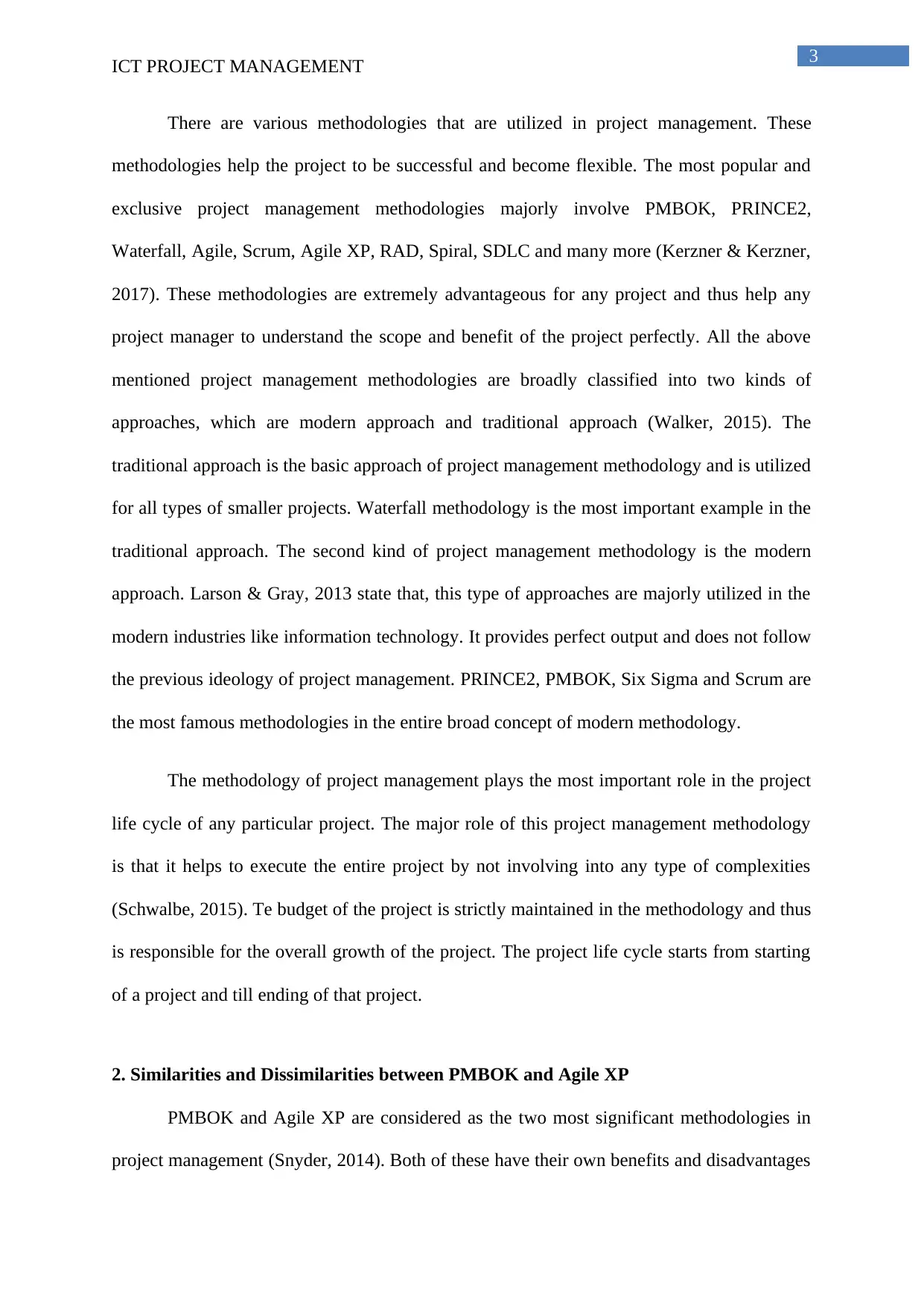
3
ICT PROJECT MANAGEMENT
There are various methodologies that are utilized in project management. These
methodologies help the project to be successful and become flexible. The most popular and
exclusive project management methodologies majorly involve PMBOK, PRINCE2,
Waterfall, Agile, Scrum, Agile XP, RAD, Spiral, SDLC and many more (Kerzner & Kerzner,
2017). These methodologies are extremely advantageous for any project and thus help any
project manager to understand the scope and benefit of the project perfectly. All the above
mentioned project management methodologies are broadly classified into two kinds of
approaches, which are modern approach and traditional approach (Walker, 2015). The
traditional approach is the basic approach of project management methodology and is utilized
for all types of smaller projects. Waterfall methodology is the most important example in the
traditional approach. The second kind of project management methodology is the modern
approach. Larson & Gray, 2013 state that, this type of approaches are majorly utilized in the
modern industries like information technology. It provides perfect output and does not follow
the previous ideology of project management. PRINCE2, PMBOK, Six Sigma and Scrum are
the most famous methodologies in the entire broad concept of modern methodology.
The methodology of project management plays the most important role in the project
life cycle of any particular project. The major role of this project management methodology
is that it helps to execute the entire project by not involving into any type of complexities
(Schwalbe, 2015). Te budget of the project is strictly maintained in the methodology and thus
is responsible for the overall growth of the project. The project life cycle starts from starting
of a project and till ending of that project.
2. Similarities and Dissimilarities between PMBOK and Agile XP
PMBOK and Agile XP are considered as the two most significant methodologies in
project management (Snyder, 2014). Both of these have their own benefits and disadvantages
ICT PROJECT MANAGEMENT
There are various methodologies that are utilized in project management. These
methodologies help the project to be successful and become flexible. The most popular and
exclusive project management methodologies majorly involve PMBOK, PRINCE2,
Waterfall, Agile, Scrum, Agile XP, RAD, Spiral, SDLC and many more (Kerzner & Kerzner,
2017). These methodologies are extremely advantageous for any project and thus help any
project manager to understand the scope and benefit of the project perfectly. All the above
mentioned project management methodologies are broadly classified into two kinds of
approaches, which are modern approach and traditional approach (Walker, 2015). The
traditional approach is the basic approach of project management methodology and is utilized
for all types of smaller projects. Waterfall methodology is the most important example in the
traditional approach. The second kind of project management methodology is the modern
approach. Larson & Gray, 2013 state that, this type of approaches are majorly utilized in the
modern industries like information technology. It provides perfect output and does not follow
the previous ideology of project management. PRINCE2, PMBOK, Six Sigma and Scrum are
the most famous methodologies in the entire broad concept of modern methodology.
The methodology of project management plays the most important role in the project
life cycle of any particular project. The major role of this project management methodology
is that it helps to execute the entire project by not involving into any type of complexities
(Schwalbe, 2015). Te budget of the project is strictly maintained in the methodology and thus
is responsible for the overall growth of the project. The project life cycle starts from starting
of a project and till ending of that project.
2. Similarities and Dissimilarities between PMBOK and Agile XP
PMBOK and Agile XP are considered as the two most significant methodologies in
project management (Snyder, 2014). Both of these have their own benefits and disadvantages
Paraphrase This Document
Need a fresh take? Get an instant paraphrase of this document with our AI Paraphraser
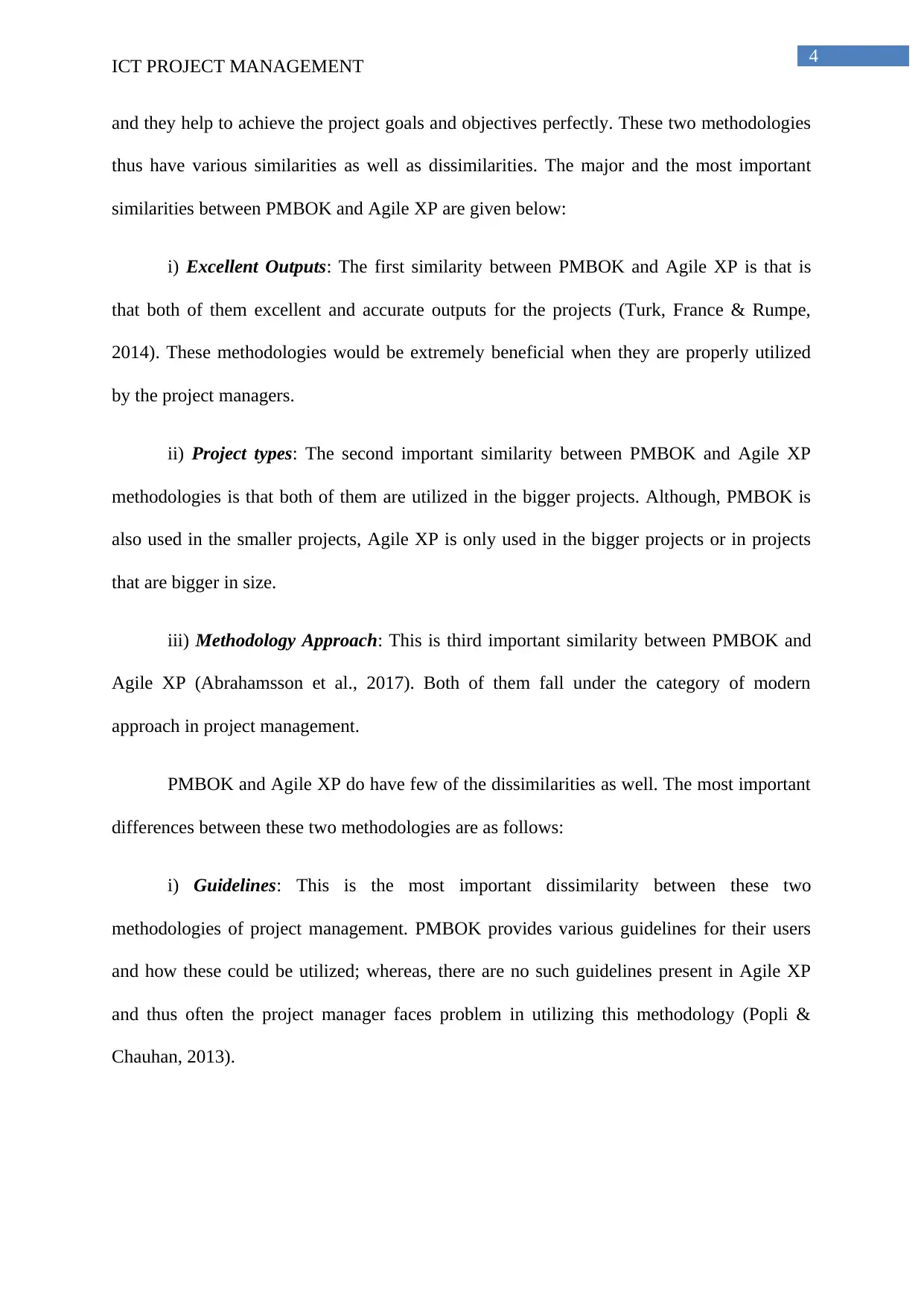
4
ICT PROJECT MANAGEMENT
and they help to achieve the project goals and objectives perfectly. These two methodologies
thus have various similarities as well as dissimilarities. The major and the most important
similarities between PMBOK and Agile XP are given below:
i) Excellent Outputs: The first similarity between PMBOK and Agile XP is that is
that both of them excellent and accurate outputs for the projects (Turk, France & Rumpe,
2014). These methodologies would be extremely beneficial when they are properly utilized
by the project managers.
ii) Project types: The second important similarity between PMBOK and Agile XP
methodologies is that both of them are utilized in the bigger projects. Although, PMBOK is
also used in the smaller projects, Agile XP is only used in the bigger projects or in projects
that are bigger in size.
iii) Methodology Approach: This is third important similarity between PMBOK and
Agile XP (Abrahamsson et al., 2017). Both of them fall under the category of modern
approach in project management.
PMBOK and Agile XP do have few of the dissimilarities as well. The most important
differences between these two methodologies are as follows:
i) Guidelines: This is the most important dissimilarity between these two
methodologies of project management. PMBOK provides various guidelines for their users
and how these could be utilized; whereas, there are no such guidelines present in Agile XP
and thus often the project manager faces problem in utilizing this methodology (Popli &
Chauhan, 2013).
ICT PROJECT MANAGEMENT
and they help to achieve the project goals and objectives perfectly. These two methodologies
thus have various similarities as well as dissimilarities. The major and the most important
similarities between PMBOK and Agile XP are given below:
i) Excellent Outputs: The first similarity between PMBOK and Agile XP is that is
that both of them excellent and accurate outputs for the projects (Turk, France & Rumpe,
2014). These methodologies would be extremely beneficial when they are properly utilized
by the project managers.
ii) Project types: The second important similarity between PMBOK and Agile XP
methodologies is that both of them are utilized in the bigger projects. Although, PMBOK is
also used in the smaller projects, Agile XP is only used in the bigger projects or in projects
that are bigger in size.
iii) Methodology Approach: This is third important similarity between PMBOK and
Agile XP (Abrahamsson et al., 2017). Both of them fall under the category of modern
approach in project management.
PMBOK and Agile XP do have few of the dissimilarities as well. The most important
differences between these two methodologies are as follows:
i) Guidelines: This is the most important dissimilarity between these two
methodologies of project management. PMBOK provides various guidelines for their users
and how these could be utilized; whereas, there are no such guidelines present in Agile XP
and thus often the project manager faces problem in utilizing this methodology (Popli &
Chauhan, 2013).
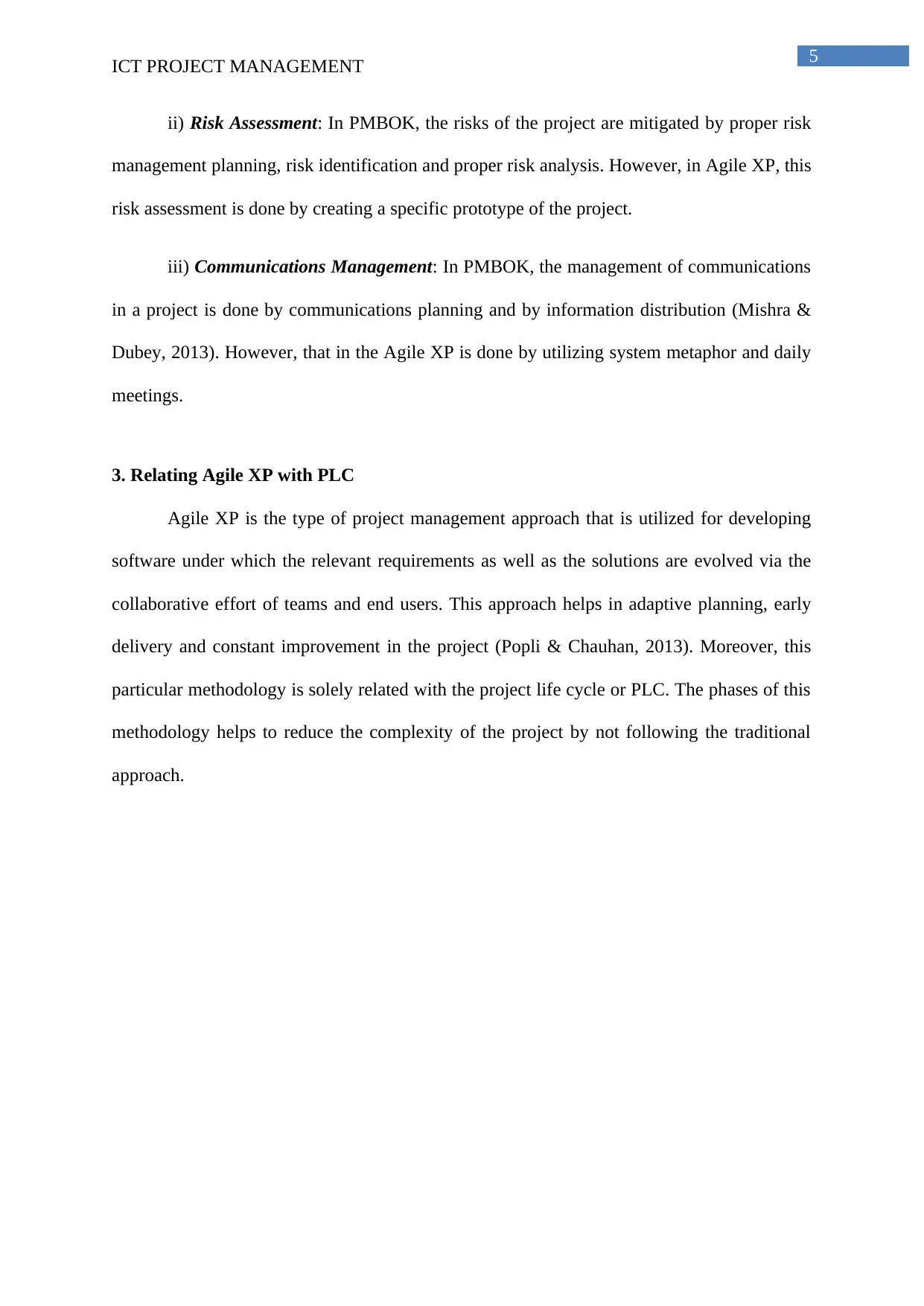
5
ICT PROJECT MANAGEMENT
ii) Risk Assessment: In PMBOK, the risks of the project are mitigated by proper risk
management planning, risk identification and proper risk analysis. However, in Agile XP, this
risk assessment is done by creating a specific prototype of the project.
iii) Communications Management: In PMBOK, the management of communications
in a project is done by communications planning and by information distribution (Mishra &
Dubey, 2013). However, that in the Agile XP is done by utilizing system metaphor and daily
meetings.
3. Relating Agile XP with PLC
Agile XP is the type of project management approach that is utilized for developing
software under which the relevant requirements as well as the solutions are evolved via the
collaborative effort of teams and end users. This approach helps in adaptive planning, early
delivery and constant improvement in the project (Popli & Chauhan, 2013). Moreover, this
particular methodology is solely related with the project life cycle or PLC. The phases of this
methodology helps to reduce the complexity of the project by not following the traditional
approach.
ICT PROJECT MANAGEMENT
ii) Risk Assessment: In PMBOK, the risks of the project are mitigated by proper risk
management planning, risk identification and proper risk analysis. However, in Agile XP, this
risk assessment is done by creating a specific prototype of the project.
iii) Communications Management: In PMBOK, the management of communications
in a project is done by communications planning and by information distribution (Mishra &
Dubey, 2013). However, that in the Agile XP is done by utilizing system metaphor and daily
meetings.
3. Relating Agile XP with PLC
Agile XP is the type of project management approach that is utilized for developing
software under which the relevant requirements as well as the solutions are evolved via the
collaborative effort of teams and end users. This approach helps in adaptive planning, early
delivery and constant improvement in the project (Popli & Chauhan, 2013). Moreover, this
particular methodology is solely related with the project life cycle or PLC. The phases of this
methodology helps to reduce the complexity of the project by not following the traditional
approach.
⊘ This is a preview!⊘
Do you want full access?
Subscribe today to unlock all pages.

Trusted by 1+ million students worldwide
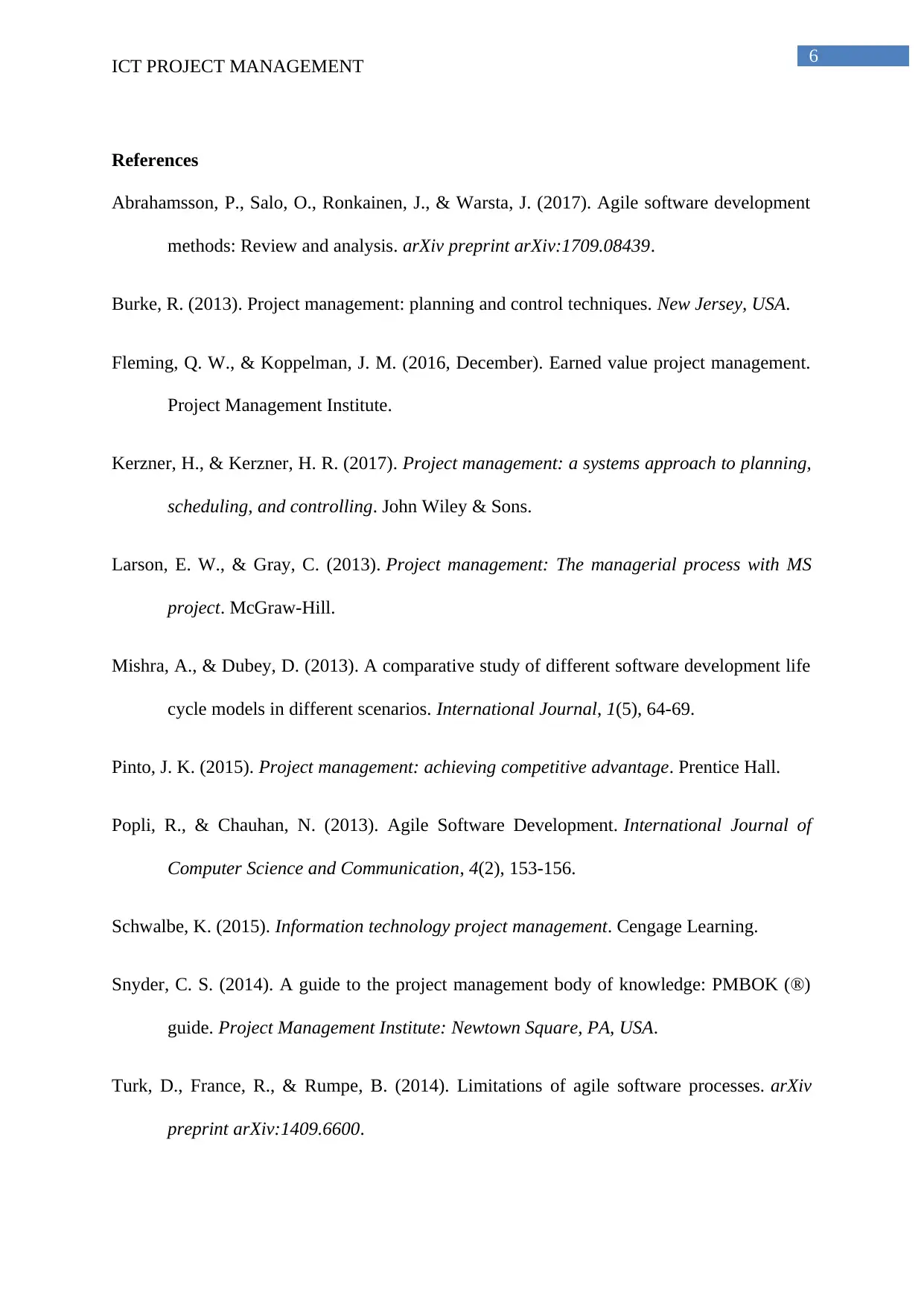
6
ICT PROJECT MANAGEMENT
References
Abrahamsson, P., Salo, O., Ronkainen, J., & Warsta, J. (2017). Agile software development
methods: Review and analysis. arXiv preprint arXiv:1709.08439.
Burke, R. (2013). Project management: planning and control techniques. New Jersey, USA.
Fleming, Q. W., & Koppelman, J. M. (2016, December). Earned value project management.
Project Management Institute.
Kerzner, H., & Kerzner, H. R. (2017). Project management: a systems approach to planning,
scheduling, and controlling. John Wiley & Sons.
Larson, E. W., & Gray, C. (2013). Project management: The managerial process with MS
project. McGraw-Hill.
Mishra, A., & Dubey, D. (2013). A comparative study of different software development life
cycle models in different scenarios. International Journal, 1(5), 64-69.
Pinto, J. K. (2015). Project management: achieving competitive advantage. Prentice Hall.
Popli, R., & Chauhan, N. (2013). Agile Software Development. International Journal of
Computer Science and Communication, 4(2), 153-156.
Schwalbe, K. (2015). Information technology project management. Cengage Learning.
Snyder, C. S. (2014). A guide to the project management body of knowledge: PMBOK (®)
guide. Project Management Institute: Newtown Square, PA, USA.
Turk, D., France, R., & Rumpe, B. (2014). Limitations of agile software processes. arXiv
preprint arXiv:1409.6600.
ICT PROJECT MANAGEMENT
References
Abrahamsson, P., Salo, O., Ronkainen, J., & Warsta, J. (2017). Agile software development
methods: Review and analysis. arXiv preprint arXiv:1709.08439.
Burke, R. (2013). Project management: planning and control techniques. New Jersey, USA.
Fleming, Q. W., & Koppelman, J. M. (2016, December). Earned value project management.
Project Management Institute.
Kerzner, H., & Kerzner, H. R. (2017). Project management: a systems approach to planning,
scheduling, and controlling. John Wiley & Sons.
Larson, E. W., & Gray, C. (2013). Project management: The managerial process with MS
project. McGraw-Hill.
Mishra, A., & Dubey, D. (2013). A comparative study of different software development life
cycle models in different scenarios. International Journal, 1(5), 64-69.
Pinto, J. K. (2015). Project management: achieving competitive advantage. Prentice Hall.
Popli, R., & Chauhan, N. (2013). Agile Software Development. International Journal of
Computer Science and Communication, 4(2), 153-156.
Schwalbe, K. (2015). Information technology project management. Cengage Learning.
Snyder, C. S. (2014). A guide to the project management body of knowledge: PMBOK (®)
guide. Project Management Institute: Newtown Square, PA, USA.
Turk, D., France, R., & Rumpe, B. (2014). Limitations of agile software processes. arXiv
preprint arXiv:1409.6600.
Paraphrase This Document
Need a fresh take? Get an instant paraphrase of this document with our AI Paraphraser

7
ICT PROJECT MANAGEMENT
Walker, A. (2015). Project management in construction. John Wiley & Sons.
ICT PROJECT MANAGEMENT
Walker, A. (2015). Project management in construction. John Wiley & Sons.
1 out of 8
Related Documents
Your All-in-One AI-Powered Toolkit for Academic Success.
+13062052269
info@desklib.com
Available 24*7 on WhatsApp / Email
![[object Object]](/_next/static/media/star-bottom.7253800d.svg)
Unlock your academic potential
Copyright © 2020–2026 A2Z Services. All Rights Reserved. Developed and managed by ZUCOL.





